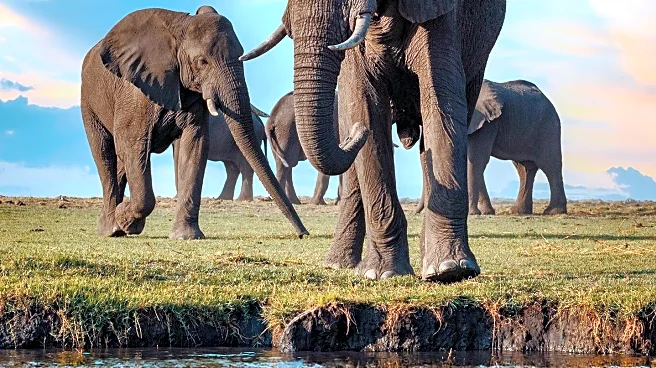What's Happening?
Two tourists, Jeff Melvin and Larry Unrein, have shared their harrowing experience of an elephant charge during a canoe safari in Botswana. The incident, captured on video, occurred when the group approached a herd of elephants, unknowingly disturbing a mother elephant with her calves. The protective mother charged at the tourists, flipping their canoe. Melvin and Unrein managed to escape with the help of their guides, while another tourist was trampled but survived, thanks to the cushioning effect of the water. Experts emphasize the danger posed by elephants protecting their young, urging tourists to maintain a respectful distance from wildlife.
Why It's Important?
This incident underscores the inherent risks of wildlife tourism, particularly in regions like Botswana where encounters with large animals are common. It highlights the need for increased awareness and safety measures for tourists engaging in safari adventures. The survival of the tourists, especially the one trampled, illustrates the unpredictable nature of wildlife interactions and the importance of having experienced guides. The event may prompt safari operators to review safety protocols and educate tourists on the importance of respecting animal territories, potentially influencing the safari industry’s approach to wildlife encounters.
What's Next?
Following this incident, safari operators might implement stricter guidelines to ensure tourist safety, including mandatory briefings on wildlife behavior and emergency response strategies. There could be increased collaboration with wildlife experts to develop comprehensive safety protocols. Additionally, the incident may lead to discussions within the tourism industry about balancing adventure with safety, possibly influencing future safari tour designs to minimize risks while preserving the authentic wildlife experience.
Beyond the Headlines
The event raises ethical considerations regarding human interaction with wildlife, questioning the impact of tourism on animal behavior and habitats. It may spark debates on the sustainability of wildlife tourism and the need for conservation efforts that prioritize animal welfare. Long-term, this could lead to a shift towards more eco-friendly and responsible tourism practices that protect both tourists and wildlife.








